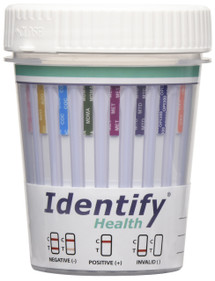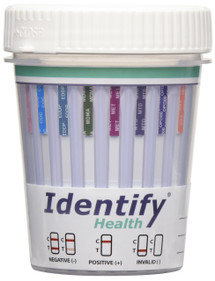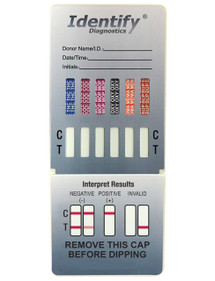Phencyclidine 25
Phencyclidine, commonly known as PCP or “angel dust” is used primarily as recreational drug due to its hallucinogenic effects. It is generally self-administered by intravenous injection or by inhalation and concentrates fastest in fatty tissues and the brain. The effects of PCP are very much dose related. Small amounts of Phencyclidines (PCP) are central nervous system stimulants that produce alertness, wakefulness, increased energy, increased heat rate, and decreased sense of pain and touch, and an overall feeling of well being. Large doses of Phencyclidine (PCP) can result in death due to convulsions, heart and lung failure and coma. Large repeated doses of Phencyclidine (PCP) could develop tolerances and physiological dependency and lead to its abuse. PCP can be found in urine within 4 to 6 hours after use and will remain in urine for 7 to 14 days. Phencyclidine is excreted in the urine as an unchanged drug (4% to 19%) and conjugated metabolites (25% to 30%). These Identify Diagnostics drug tests yield a positive result when the concentration of Phencyclidine in urine exceeds 25 ng/mL, which is the suggested screening cut-off for positive specimens set by the Substance Abuse and Mental Health Service Administration (SAMHSA, USA).
-

12 Panel Drug Test Cup with BUP - Identify Diagnostics CLIA Waived
Identify Diagnostics
$110.00 - $12,600.00Identify Diagnostics 12 Panel point of care drug test cup with BUP - POCTOUR MADE IN USA VERSION OF THIS SAME 12 PANEL IS AVAILABLE AT SAME PRICE WHILE WE RESTOCK. SHOP IT HERE. PLEASE NOTE: This same 12 Panel Cup is available in smaller boxes of 2, 5,...$110.00 - $12,600.00 -

12 Panel Drug Test Cup with BUP, PCP - Identify Health CLIA Waived
Identify Health
$110.75 - $11,960.00Identify Health 12 Panel Drug Test Cup - Configuration with PCPAvailability:Ships same day if by 3pm EST. Signature required delivery.- CLIA Waived- FDA Cleared 510(K) - Urine temperature strip included- We have two different configurations of our...$110.75 - $11,960.00 -

16 Panel Drug Test Cup with ETG, FEN, K2, TRA - Identify Health
Identify Health
$171.25 - $16,840.00Identify Health 16 Panel Drug Test Cup with premium FUO panels: ETG, FEN, K2, TRA Availability: This item is in stock and ready to ship. - Intended for Forensic Use Only (FUO)- Urine temperature strip included- Purchase in bulk or small...$171.25 - $16,840.00 -

9 Panel Drug Test Cup with BUP - NO THC - Identify Health CLIA Waived
Identify Health
$88.00 - $10,600.00Identify Health 9 Panel Drug Test Cup - NO THCAvailability:This product is available. - CLIA Waived- FDA Cleared 510(K) - Urine temperature strip included- Purchase in bulk or small quantities to meet your specific volume needs- Choose from cup...$88.00 - $10,600.00 -

10 Panel Drug Test Cup - Identify Diagnostics CLIA Waived
Identify Diagnostics
$87.50 - $10,520.00Identify Diagnostics 10 Panel point of care drug test cup - POCTPLEASE NOTE: This same 10 Panel Cup is available in smaller boxes of 5, 10, 15: HERE.Availability:Ships same day if by 3pm EST. Signature required delivery.- CLIA Waived- FDA Cleared...$87.50 - $10,520.00 -

11 Panel Drug Test Cup with BUP - Identify Health CLIA Waived
Identify Health
$110.00 - $3,160.00Identify Health 11 Panel Drug Test Cup - NO THCAvailability:Not available at this time- CLIA Waived- FDA Cleared 510(K) - Urine temperature strip included- Purchase in bulk or small quantities to meet your specific volume needs- Choose from...$110.00 - $3,160.00 -

12 Panel Drug Test Cup with BUP and Adulterations - Identify Diagnostics CLIA Waived
Identify Diagnostics
$110.00 - $12,600.00Identify Diagnostics 12 Panel with 3 Adulterants point of care drug test cup - POCTAvailability:This product is In Stock and Ready to Ship.- CLIA Waived- FDA 510(K) Cleared- Over The Counter OTC Cleared- Urine temperature strip included- Purchase in bulk...$110.00 - $12,600.00 -

12 Panel Drug Test Cup with BUP - Identify Diagnostics USA CLIA Waived
Identify Diagnostics USA
$110.00 - $10,080.00Identify Diagnostics USA - 12 Panel point of care drug test cup with BUP - POCTAvailability:Ships same day if by 3pm EST. Signature required delivery. - MADE IN USA- CLIA Waived- FDA 510(K) Cleared- Over The Counter OTC Cleared- Urine temperature strip...$110.00 - $10,080.00 -

13 Panel Drug Test Cup - Identify Health CLIA Waived
Identify Health
$125.75 - $11,920.00Identify Health 13 Panel Drug Test Cup - Configuration with PCPAvailability:Ships same day if by 3pm EST. Signature required delivery.- CLIA Waived- FDA Cleared 510(K) - Urine temperature strip included- Purchase in bulk or small quantities to...$125.75 - $11,920.00 -

13 Panel Drug Test Cup - Identify Diagnostics CLIA Waived
Identify Diagnostics
$127.80 - $3,456.00Identify Diagnostics 13 Panel point of care drug test cup - POCTPLEASE SEE OUR 13 PANEL IDENTIFY HEALTH CUP HEREAvailability:Ships same day if by 4pm Eastern. SIGNATURE required delivery. - CLIA Waived- FDA 510(K) Cleared - Over The Counter OTC...$127.80 - $3,456.00 -

14 Panel Drug Test Cup with EDDP & 6 Adulterants - Identify Health CLIA Waived
Identify Health
$146.25 - $15,600.00Identify Health - 14 Panel point of care drug test cup with EDDP and 6 Adulterations - POCTAvailability:Ships same day if by 3pm EST. Signature required delivery. - CLIA Waived- FDA 510(K) Cleared - Over The Counter OTC Cleared- Urine...$146.25 - $15,600.00 -

14 Panel Drug Test Cup with EDDP & 6 Adulterants - Identify Diagnostics USA CLIA Waived
Identify Diagnostics USA
$198.25 - $24,200.00Identify Diagnostics USA - 14 Panel point of care drug test cup with EDDP and 6 Adulterations - POCTAvailability:Ships same day if by 3pm EST. Signature required delivery.- MADE IN USA- CLIA Waived- FDA 510(K) Cleared - Over The Counter OTC...$198.25 - $24,200.00 -

16 Panel Drug Test Cup with ETG, FEN, K2, TRA - Identify Diagnostics USA
Identify Diagnostics USA
$188.38 - $1,331.00Identify Diagnostics USA 16 Panel Drug Test Cup with premium FUO panels: ETG, FEN, K2, TRA - Made in USA Availability:Ships same day if by 3pm EST. Signature required delivery. PLEASE NOTE: We have a non-USA Made version of this same 16 PANEL cup. It...$188.38 - $1,331.00 -

12 Panel Drug Test Dip - Identify Diagnostics CLIA Waived
Identify Diagnostics
$68.25 - $9,800.00Identify Diagnostics 12 Panel Drug Test Dip CardAvailability:This item is available to ship.- CLIA Waived- FDA 510(K) Cleared- Over The Counter OTC Cleared- Purchase in bulk or small quantities to meet your specific volume needs- Choose...$68.25 - $9,800.00
